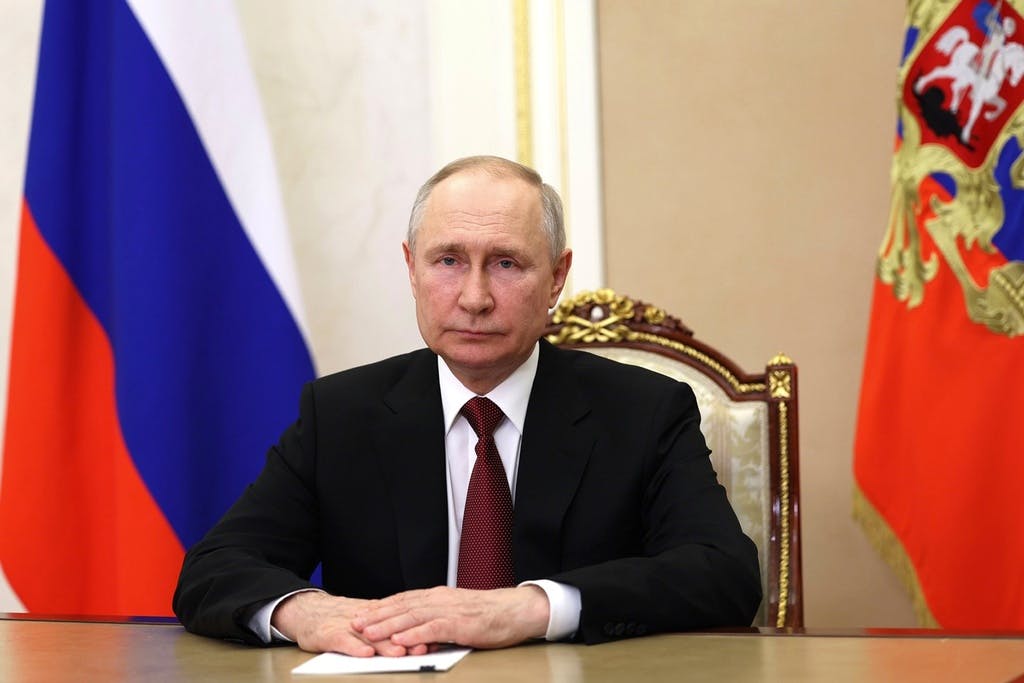Putin, Denouncing ‘Traitors,’ Says Mercenary Uprising Aided Russia’s Enemies
Speaking in a stern tone and looking tired in a TV address near midnight, the Russian president strikes a balance between criticizing the uprising’s perpetrators to prevent another crisis, and not antagonizing the bulk of the mercenaries and their hardline supporters.

President Putin on Monday blasted organizers of a weekend revolt, the gravest threat yet to his power, as “traitors” who played into the hands of Ukraine’s government and its allies.
Speaking in a stern tone and looking tired in a five-minute TV address near midnight, Mr. Putin sought to project stability. He tried to strike a balance between criticizing the uprising’s perpetrators to prevent another crisis, and not antagonizing the bulk of the mercenaries and their hardline supporters, some of whom are incensed at the Kremlin’s handling of the situation.
Mr. Putin, whose troops are stretched thin in the face of a Ukrainian counteroffensive, praised the rank and file mercenaries for not letting the situation descend into “major bloodshed.” And he said the nation had stood united, although there had been localized signs of support for the uprising.
Earlier in the day, the head of the mercenary Wagner Group, Yevgeny Prigozhin, who led the rebellion, defended his short-lived insurrection. He again taunted Russia’s military, but said he hadn’t been seeking to stage a coup against Mr. Putin. On Friday, Mr. Prigozhin had called for an armed rebellion to oust the military leadership.
Mr. Putin’s address was announced by his spokesman in advance and billed by Russian state media as something that would “define the fate of Russia.” In fact, the address didn’t yield groundbreaking developments.
A former Kremlin speechwriter turned political analyst, Abbas Gallyamov, called the address weak. In a Facebook post, he said it was a sign that Mr. Putin is “acutely dissatisfied with how he looked in this whole story and is trying to correct the situation.”
The Kremlin later showed Mr. Putin meeting with top security, law enforcement and military officials, including his Defense minister, Sergei Shoigu, whom the uprising had tried to remove.
Mr. Putin thanked members of his team for their work over the weekend, implying support for the embattled Mr. Shoigu. Earlier, the authorities released a video of Mr. Shoigu reviewing troops in Ukraine.
Mr. Putin, who declined to name Mr. Prigozhin, said mutiny organizers had tried to force the group’s soldiers “to shoot their own.”
He said “Russia’s enemies” had hoped the mutiny would divide and weaken Russia, “but they miscalculated.”
Western officials have been muted in their public comments on the mutiny, and President Biden said Monday that the U.S. and NATO were not involved.
Speaking at the White House, Mr. Biden said he was cautious about speaking publicly because he wanted to give “Putin no excuse to blame this on the West and blame this on NATO.”
“We made clear that we were not involved, we had nothing to do with it,” he said.
Mr. Prigozhin said he had been acting to prevent the destruction of Wagner, his private military company. “We started our march because of an injustice,” he said in an 11-minute statement Monday, giving no details about where he was or what his plans were.
The injustice apparently was a government order requiring Wagner soldiers, if they want to remain fighting, to sign contracts with the Defense Ministry by July 1, which might effectively disband the group despite its battlefield successes in Ukraine. Mr. Prigozhin also accused Russia’s military of attacking his troops, prompting his march.
The feud between the Wagner Group leader and military brass has festered throughout the war, erupting into mutiny when mercenaries left Ukraine to seize a military headquarters in the southern Russia city of Rostov.
They rolled seemingly unopposed for hundreds of miles toward Moscow before turning around after less than 24 hours on Saturday.
The Kremlin said it had made a deal for Mr. Prigozhin to move to Belarus and receive amnesty, along with his soldiers. There was no confirmation of his whereabouts Monday.
Mr. Prigozhin boasted that his march was a “master class” on how Russia’s military should have carried out the February 2022 invasion of Ukraine. He also mocked the military for security breaches that allowed Wagner to march 500 miles toward Moscow without facing resistance.
The future of Mr. Prigozhin and his forces is unknown under the deal purportedly brokered by Belarusian President Alexander Lukashenko.
